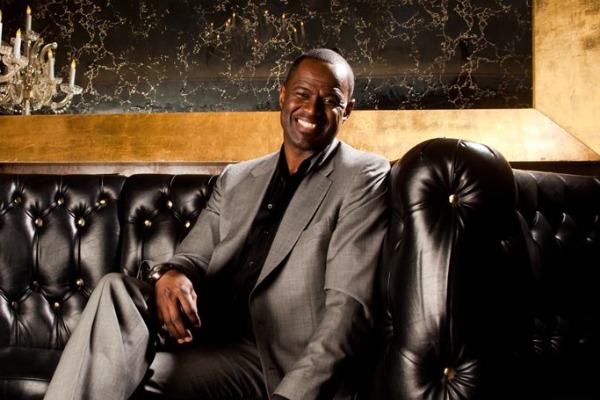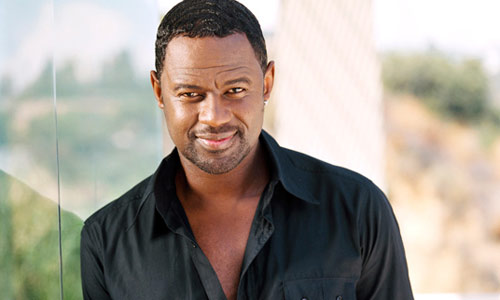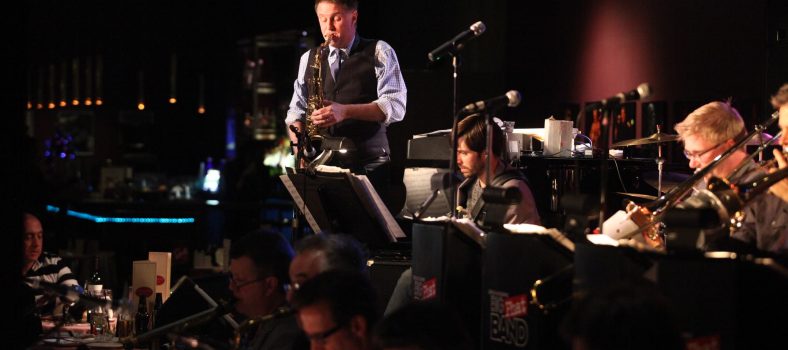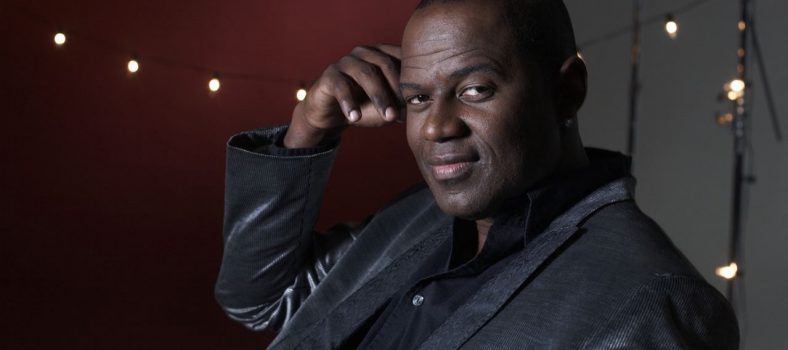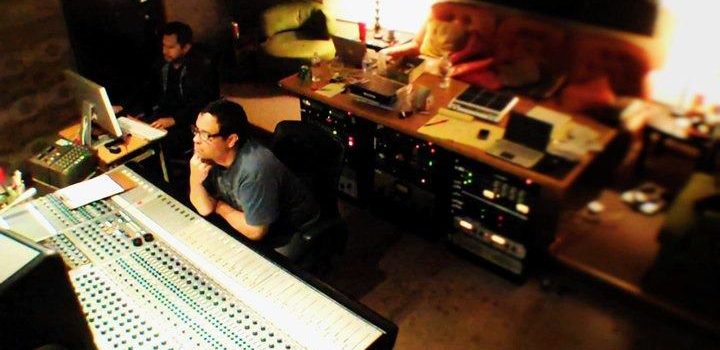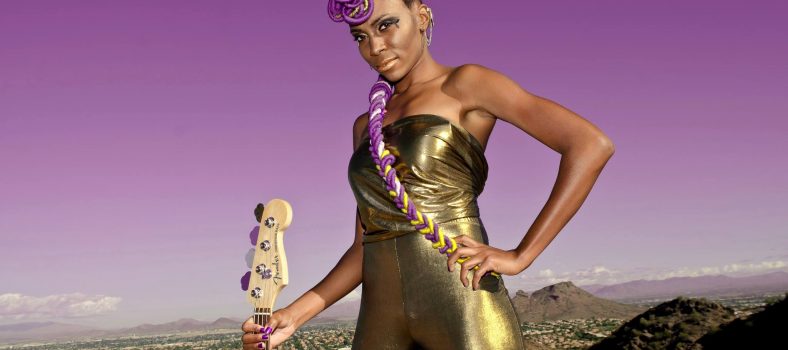It’s easy to believe that the advancement of social media is a key factor in Brian McKnight current predicament. Some may even think that it’s his naïve attitude toward the internet that contributed to the outrage of the “If You’re Ready to Learn” video. McKnight perhaps did underestimate the rapid power of blogging, but he’s embraced technology wholeheartedly. It’s evident in his new approach toward releasing his music. After 21 years in the business, he’s opted to release his music himself, one song at a time, and eliminate the middle man. “Handing [music] off to a record label who are only gonna give me excuses to why they can’t get it done isn’t gonna work anymore,” McKnight explains. “I’ve got a fan base, they’re on their computer; I can do anything I want. I’m not going to radio saying ‘You should play this.’ If they decide to play it, that’s fine. If not, I have your e-mail address.”
The seeds of McKnight’s weariness of major label politics were sown after signing with Mercury. His self-titled solo album was released in July 1992, when he was only 23 years old. He’d co-written and produced 12 of the 13 tracks. Despite being a cog in the major label machine, Brian didn’t allow himself to be affected by the pressure of creating a hit song. “I’m never writing a song [thinking] ‘this has to be a single; this has to be on the radio.’ I just try to write a great song. I wrote 150 songs for that first album. The process of what becomes a single is never up to the artist, especially not at the beginning.”
Even though label exec Ed Epstein awarded McKnight creative freedom uncommon for a new artist, Brian McKnight sold slowly at first. Not even his hit duet with Vanessa Williams “Love Is” from Beverly Hills 90210 soundtrack was enough to move his LP. All that changed with the release of second single, “One Last Cry,” a song tailor made for quiet storm formats and the break-up-song Hall of Fame. “That song comes out and two months later, I got a platinum record,” McKnight recalls. “So, it was like every dream I ever had at this point – like being rich [Chuckles] – has now come true. It was a crazy thing, that somebody tells you, you can sell a million records, and you go out and do it. Little do you know is that you have to go and try do it again.”
Expectations were high for McKnight’s second album, 1995’s I Remember You. A cover of Van Morrison’s “Crazy Love” received heavy radio spins, but the album only sold half as much as its predecessor. Brian got a rude awakening about the “peaks and valleys” of chart prosperity. “What you don’t know then, too, is the changes of the people around that are handing your music off as well. I said to myself, ‘Ok. “One Last Cry” was a huge success. Let me write a whole record of that. It’s very difficult to come behind success with success. That record was a gold record, after a platinum record. To some people, that’s not success, and I think that some of my best writing is on that album. I don’t think that I get to the success of an Anytime without the pseudo-failure of the I Remember You album.”
***
At the time Brian McKnight was becoming a worldwide trending topic on Twitter thanks to the instant infamy of “If You’re Ready to Learn,” he was weeks away from a four night run at New York’s Blue Note Jazz Club. McKnight was preparing for his second stint singing with the Duke Ellington Orchestra. This has been a tailor made outlet from him, performing with top shelf musicians, singing prime Ellington compositions, as well as singing his material to big band arrangements. “Most jazz musicians know that I’m a jazz musician,” McKnight expressed. “They called me to come do a show in Tokyo with them, and I said ‘that’d be cool, to at least go to Tokyo.’ I had the greatest time going there and doing jazz with them. When they called me to come back this year, I made myself available to be able to make that happen, because it’s such an education, being able to sing with these incredible musicians. It’s absolutely amazing.”
Working with fellow musicians is something Brian doesn’t take for granted. In the protools/auto- tune era, musicianship is something he thinks has been steadily diminishing. McKnight first sensed it when he was approached to incorporate sampling during the I Remember You and Anytime sessions. Although a handful of his work since has included the practice – he admits his collaboration with Puff Daddy and Mase on the Anytime single, “You Should Be Mine” “helped the profile,” and exposed him to a wider audience – it’s been mostly obligatory and Brian would prefer to avoid it if necessary. “If I had it my way, no one would ever sample anything,” McKnight revealed. “I always felt like, if I’m gonna sample somebody else’s tune and give them a piece of their own song, as a songwriter that doesn’t seem right, as opposed to just doing a cover where that person gets all the credit.”
Fiscal principle, however, pales in comparison to his lack of respect for its originality. “It’s also kept people from being creative. If I could take a sample, then I don’t need to know how to play. I don’t need to learn how to do anything; I can just take their stuff, put my name it. I’ve never been okay with that, but I did explore it because if you can’t beat ‘em, you gotta join ‘em.” But while McKnight prefers his piano and guitar to an MPC, he does hold a select few producers and DJs in high regard. “If you look at guys like Ali Shaheed Muhammad from A Tribe Called Quest, I think he was very creative with the sampling that he did do. It wasn’t just a blatant rip of a song; you know what I’m saying? Guys like him and DJ Premier…I tend to lean more towards the New York Hip-Hop than any other areas because it seemed like with the tracks they were sampling, it was far more creative.”
In 1999, Brian was about to embark on the most creative period of his life. The triumph of the double platinum Anytime album, which sold 2 million copies, poured right into the sessions of Back at One, McKnight’s first album after signing with Universal Motown. The album sold three million copies and the title track was a huge crossover smash, reaching number 2 on the Billboard Hot 100. “It was that moment of, ‘Be careful what you wish for because you might just get it,’” Brian reminisces. “If Anytime was the spark, then Back at One became the fire. I was doing things then that I had never done before, that an audience had never heard or seen. How many young, black ballad singers were on pop radio? Luther never did it. Lionel Richie was probably the only one, up to that point, who had had that kind of pop success as a Black man. For a straight ballad from a brown skin brother on pop radio at number one, right next to Santana and Rob Thomas (“Smooth”), it was something that I’d never seen.” On the outside looking in, it seemed McKnight was riding high, but in reality, he was tormented by the true inspiration behind his greatest success:
“That whole record was about one person, and the problem was I was in love with somebody who was not my wife – and I was married at the time. “Back at One” was one of the first songs I wrote when everything was going, what I thought, was good. But by the time I got to “6, 8, 12” is when it fell apart. If you listen to that album from beginning to end, you’ll hear this, all the way to “Lonely” near the end. And “Home,” because I’d realized how far out I’d gotten and I really needed to get my shit together. I don’t even listen to that record because it was the highest and lowest point of my life, because of this person. And it wasn’t her fault; it was because my own selfishness got me into that situation. All of my life, I make my good decisions and bad decisions and eventually, all those situations come out in a song.”
***
Back at One established Brian McKnight as an international pop star, distinguishing himself from contemporaries like Kenny “Babyface” Edmonds and R. Kelly. Babyface and Kelly, who were still considered R&B at the core, achieved the majority of their success by writing and producing pop hits from other artists. McKnight, for a time, contributed his production services to pop, soul and jazz artists, such as Justin Timberlake, Az Yet, Take 6, Vesta Williams, Kenny G. and Wayman Tisdale. However, he’s been far less prolific in that regard. This is something he contends is by design. “I think that the songs that I write aren’t very easy to sing. I’ve never had that talent; I wish I had the talent to be able to write a song that everybody could sing.” He continued, “When I was doing it, and I was writing for other people and producing, I was doing it only for the money. It made me very shallow and empty because I don’t wanna produce vocals for a whole day. When record companies stopped signing people that could sing, I got out of the writing/producing business.”
Indeed, McKnight is less than optimistic about the direction that music has taken in the decade since Back at One. He’s has done his part; releasing six albums, all peaking in the R&B top 10 charts, but he’s accepted that the industry has moved on from powerful voices and songwriters to rappers and beat makers. “For the most part, Hip-Hop’s taken over, and that’s where it’s gonna stay, ‘cause everybody can talk,” McKnight proclaims. “People say, ‘I can do that. Why should I have to be able to sing when I’m trying to get on, and all I gotta do is [rap]?’ Do you think it’s a coincidence that Drake can kinda sing? I’m sure what he wanted to do was sing, but if he to figure out a way to really get on, so he sings/raps? That’s the way to go if you can halfway sing.”
McKnight may not be alone on his indictment on the (d)evolution of today’s radio music, but he contends that those who also condemn it aren’t active in providing a solution. “I think we’re all to blame. If we’re all gonna stand by and watch the bar get dropped into the basement –and not just with music, but with everything – then don’t be mad or upset when few of us decide to swim around in the bottom.”
Determined to maintain his integrity, Brian McKnight is now committed to letting his music rise above all else. His current live shows, documented best on his 2011 double album Just Me, McKnight performs alone on stage, armed with only his guitar, his piano and his voice. It’s his way of reminding the fans of the foundation of their adoration. “When it’s just me, people actually have an opportunity to actually listen to what I’m doing and get a perspective of why I did it, and how I did it,” McKnight spoke of his one-man show. “When I go out there with just a guitar, or just a piano, they actually have to sit there and listen…and they have to feel something, which I found is a remarkable thing because we live in a day and age when many people think nobody wants to hear that, but that’s not true. They all come out and they get that from me.”
McKnight, controversy notwithstanding, will continue to make music his way, without trying to fulfill the expectations of others. He’s also aware that the major label dream is still in the eyes of young artists, and he offers them this advice: “If you wanna go all in with this music thing, you better love it. You better love it with everything you got. That should be your motivation, because like I said earlier, it’s gonna let you down at some point. You better have some love to bridge the gap between the high points and low points.”
By Matthew Allen


